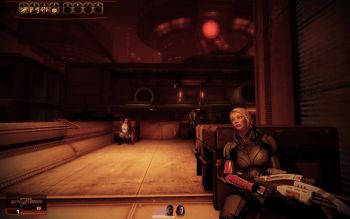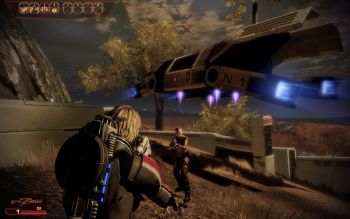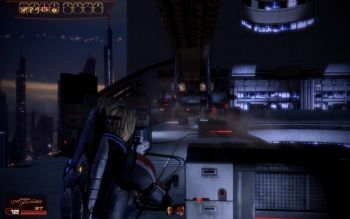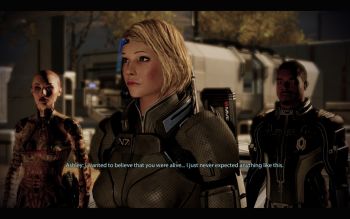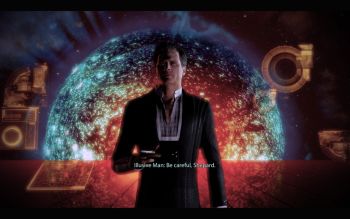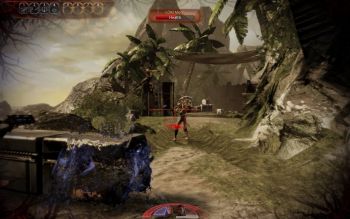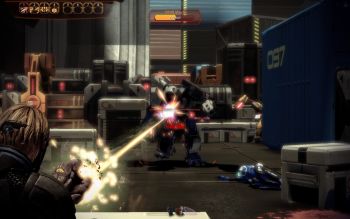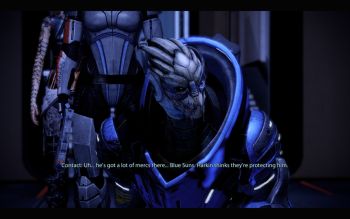Mass Effect 2
Despite some obvious flaws, I really liked Mass Effect. Then it's only a good thing that Mass Effect 2 doesn't do many things differently: In many ways, it is a full-length expansion. But that's merely a consequence of the fact that these days the technologies powering games advance in smaller leaps, a fact that has its ups and downs. Hence the similarity between, say, Modern Warfare 2 and Modern Warfare 3 and Mass Effect and Mass Effect 2. For now, gone are the days when it took only a year and a half to go from Quake to Quake 2, a remarkable graphical leap. As such, the emphasis of this review is on improvements.
Upon starting the game you are given a chance to import your character, along with her stats, from the first game. This is brilliant as it instantly establishes a continuity between what you were and did in the first part and what choices you have in the second. As such, it's more than just importing a character and her stats. It's about importing the events of Mass Effect 1 as well (saved me the trouble of having to deal with politicians in ME2). The game begins not long after the first part ended. After a short but explosive prelude, you find yourself working for Cerberus, one of those organizations that fall either under the "terrorist" or "freedom fighter" label. A great thing about modern games is that an increase in production values has led to developers investing more in voice acting, an aspect that's been a bit neglected in the past. Voice acting in Mass Effect 2 is mostly very good but what really takes it to a whole new level is Martin Sheen as the Illusive Man, the head of Cerberus and as such your employer whose motives and goals are about as clear as those of the Cigarette Smoking Man. But you always look forward to having a chat with him, not just to hear Martin Sheen speak but also to perhaps catch a glimpse of who the Illusive Man really is.
Combat system, the first game's biggest problem, has been improved. No more tedious overheating or having to revive dead squadmates constantly. In fact, in ME2 you barely even notice your squadmates, which is pretty much the way it should be. The cover system, which in ME1 couldn't really decide whether it was there to help you or to interfere, is much smoother now. There are some cool new abilities as well such as invisibility which can really help you out of a tough spot or in surprising the enemy (but at the price of disabling shield/health regen momentarily). Sometimes your movements feel a bit too constrained since there's no free jumping or crouching - even "scripted" jumps over obstacles seemed a bit too hard (or just impossible) sometimes, especially after having gotten used to Battlefield 3's incredibly smooth system.
There's health regeneration now, but it works since the game's locations tend to be quite linear anyway so backtracking for health kits would feel stupid. It does make the game easier, of course, as I must've died only twice during the game. Another aspect that's been streamlined is the inventory system, which is effectively gone now. This is most welcome as ME1 compelled you to spend way too much time in inventory menus, getting rid of useless stuff which had a bad tendency to pile up.
The cool Mako car from ME1 lies next to the ruins of the old Normandy ship so no more looking for pitiful scraps. The new mineral scanning system is pleasant and quick. Every solar system has some planets that you can scan for minerals and everything is done from the orbit so there's no need to land. The scanning process itself is even somewhat addicting as you get a tiny rush every time you hit a sweet spot. As said, the process doesn't take long and there are some implicit rules about which planets you should explore for minerals. You get a lot of bang for the buck as the price of fuel is cheap and only needed for intra-nebular travel anyway (for longer distances you use the "Mass Effect" relays, the game's solution to Special Relativity). As a nice surprise, occasionally you stumble upon an anomaly, a sign of a sidequest.
Another notable problem with Mass Effect were the cheap sidequests that merely recycled the same locations from one planet to another, only with a bit different texturing each time. ME2 solves this problem quite effectively as the game's sidequests help unearth stories and secrets about your squadmates. Even more, they affect some aspects of the ending (which I didn't know until I got there but luckily my losses were negligible) and as such many of them should be considered semi-mandatory. Sure, there's the occasional "fetch food ingredients from another solar system for the Normandy's cook" but you can just skip these as they have such a poor benefit-effort ratio anyway (depending on how much you value your own time, that is).
But once again what really makes the game work is its universe; the art direction, the music, the different alien cultures with well-established backgrounds, the story and so on. Many would argue that characters are the core of a game like this but like in ME1, I wasn't really interested in establishing and fostering relationships between them so some aspects of the game that have been widely applauded remained totally uninteresting as fas as I was concerned. But at least the game gave me a choice not to care (politely!). My old problem of having trouble connecting names to faces also caused some trouble as I still have no idea who the fuck are the Asari, the Geth, the Turians or whoever.
A bit surprisingly level design in ME2 turned out to be slightly disappointing. It's as if the levels felt more narrow and less ambitious: they didn't quite have that sense of scale that pervaded level design in ME1. The lack of the Mako car certainly contributed to this as having it in ME1 meant many open environments that you could explore, even if they were rather barren and uninteresting. Moreover, with no vehicle segments, the in-mission gameplay felt more repetitive especially with the total lack of any kind of environmental puzzles or platforming: In many ways combat in ME2 is even more repetitive and simplistic than in Modern Warfare. Hacking and bypassing electronic devices have also been watered down as not once did I even come close to running out of time. Another thing I was left missing were day-night and weather cycles which should be mandatory in any game where you're free to return to previous locations. Now, upon returning to, say, Illium (the future equivalent of modern-day Hong Kong or 17th century Amsterdam), the place looks just as it did before, with the same weather and time of day. This gives the game's otherwise rich world a disappointingly static look.
Another little complaint concerns the storyline. While the Reaper threat in ME1 made you feel like you were racing against time, no such panic arises in ME2. In fact, you spend most of your time assembling a team. Shortly after you're done with that, the game is over. This isn't to say the game was too short; at around 20 hours (including all meaningful sidequests) its length was about perfect but the big galactic threat remains in the background, probably for Mass Effect 3 (still waiting for Origin sales). Still, the last few hours of the game are pretty memorable stuff.
Conclusion: Unlike with Mass Effect, I had a good start with Mass Effect 2. The universe established in the first part provided ample opportunities for further stories. Moreover, you always expect a sequel to improve on the first. This Mass Effect 2 did to a considerable degree, fixing the meaningless sidequests and the flawed combat system. Graphically, it could be more ambitious and its storyline is not quite as epic as that of the first but then again it need not be. Mass Effect 2 went for a more character-based storyline, dealing as much with the explicit enemy as the implicit. Can't wait for the third.





